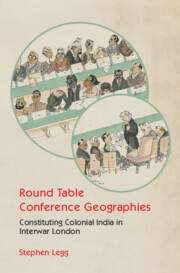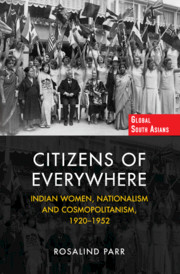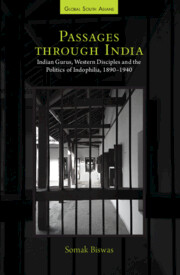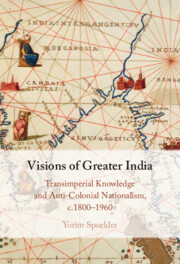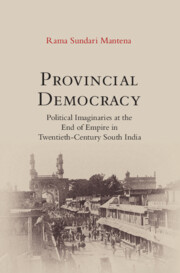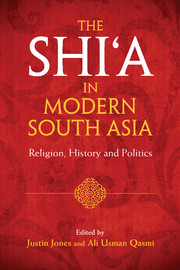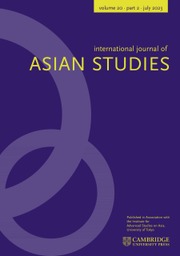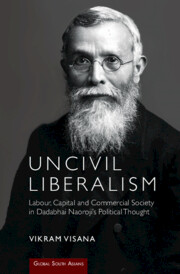
Uncivil Liberalism
Labour, Capital and Commercial Society in Dadabhai Naoroji's Political Thought
Part of Global South Asians
- Author: Vikram Visana, University of Huddersfield
- Date Published: November 2022
- availability: Available
- format: Hardback
- isbn: 9781009215541
$
99.99
Hardback
Other available formats:
eBook
Looking for an inspection copy?
This title is not currently available for inspection. However, if you are interested in the title for your course we can consider offering an inspection copy. To register your interest please contact [email protected] providing details of the course you are teaching.
-
Uncivil Liberalism studies how ideas of liberty from the colonized South claimed universality in the North. Recovering the political theory of Dadabhai Naoroji, India's pre-eminent liberal, this book offers an original global history of this process by focussing on Naoroji's pre-occupation with social interdependence and civil peace in an age of growing cultural diversity and economic inequality. It shows how Naoroji used political economy to critique British liberalism's incapacity for civil peace by linking periods of communal rioting in colonial Bombay with the Parsi minority's economic decline. He responded by innovating his own liberalism, characterized by labour rights, economic republicanism and social interdependence maintained by freely contracting workers. Significantly, the author draws attention to how Naoroji seeded 'Western' thinkers with his ideas as well as influencing numerous ideologies in colonial and post-colonial India. In doing so, the book offers a compelling argument which reframes Indian 'nationalists' as global thinkers.
Read more- Discusses how liberal ideas were innovated by the Parsis of western India and subsequently exported to the 'West' to critique European politics and society
- Explores how Naoroji's economic liberalism was linked to the issue of communal violence
- The first book to place Naoroji's theory in dialogue with that of other Indian thinkers of his period and after
Awards
- Shortlist, 2023 Gladstone Book Prize, Royal Historical Society
Reviews & endorsements
'This important book brings to us a new Dadabhai Naoroji by taking him out of the confining narrative of economic nationalism and showing him as a global figure who redefined liberalism by putting the question of labour and labour rights at its very heart. The author offers us an opening towards a new history of global economic thought that could transform how we understand the remit of political philosophy today.' Prathama Banerjee, Centre for the Study of Developing Societies, Delhi
See more reviews'By far the most sophisticated study of Naoroji's career, Visana's book is also an account of the making of Indian liberalism in its most universal form – that defined by political economy. Rather than being derived from a dialogue with European ideas, however, he explores the paradox of how this universal form emerged within the lifeworld of one of India's smallest communities, the Parsis of Bombay.' Faisal Devji, University of Oxford
'Uncivil liberalism is a fascinating and innovative analysis of one of the most perceptive liberal thinkers of the nineteenth century. In this impressive monograph, Visana unpacks the sophisticated and multi-layered political philosophy of 'the Grand Old Man of India', places it in its historical context and explains its relevance and long-term significance.' Eugenio F. Biagini, University of Cambridge
'Uncivil Liberalism recovers Dadabhai Naoroji's radical liberalism in all its complexity. The author's rich and engaging account sets in its global context Naoroji's famous argument that imperial monopoly capitalism was draining India of its wealth and its moral resources. Visana takes us from Naoroji's roots in the Parsi social reform movements of 1840s Bombay to his encounters with Irish republicans, Fabians, and his own working-class constituents in Britain to explore Naoroji's capacious political vision of a diverse commercial society grounded in labour rights.' Jennifer Pitts, University of Chicago
Customer reviews
Not yet reviewed
Be the first to review
Review was not posted due to profanity
×Product details
- Date Published: November 2022
- format: Hardback
- isbn: 9781009215541
- length: 275 pages
- dimensions: 236 x 160 x 20 mm
- weight: 0.48kg
- availability: Available
Table of Contents
Introduction
1. Sociality in an Imperial and Industrial Age
2. Sociality and the Parsis of Western India
3. Civil Society and Social Reform
4. Conceptualizing the Drain Theory
5. Making Commercial Society in India
6. Making Commercial Society in Britain
7. The Afterlives of Naoroji's Political Thought
Conclusion
References
Index.
Sorry, this resource is locked
Please register or sign in to request access. If you are having problems accessing these resources please email [email protected]
Register Sign in» Proceed
You are now leaving the Cambridge University Press website. Your eBook purchase and download will be completed by our partner www.ebooks.com. Please see the permission section of the www.ebooks.com catalogue page for details of the print & copy limits on our eBooks.
Continue ×Are you sure you want to delete your account?
This cannot be undone.
Thank you for your feedback which will help us improve our service.
If you requested a response, we will make sure to get back to you shortly.
×
